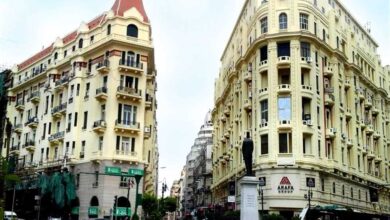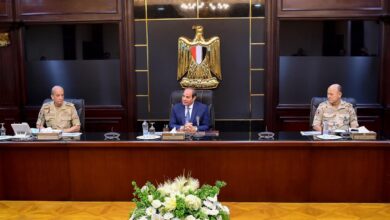
With the scent of tear gas lingering over Tahrir Square, the future of Egypt’s first post-Mubarak election appears uncertain.
Only a week stands between Egyptians and a significant poll that could be the first milestone on the road to transition from military to civilian rule. But ongoing clashes between thousands of protesters, who say they won’t leave until the military relinquishes power and the police, raise questions over whether a poll can be held at the current time. Some individual candidates and youth groups have suspended their electoral campaigning.
Shady al-Ghazaly Harb, a representative of the Revolution Youth Coalition, said that the protest will continue until a new government is formed. “We need a national salvation cabinet that understands revolutionary demands, has dignity and wide authority to reinstate security and improve the economy,” he said.
For at least five months, different political groups have been adamantly calling for the dismissal of interim Prime Minster Essam Sharaf’s cabinet for its failure to improve security and force the SCAF to introduce political reform. Recurring clashes between police and protesters have stood as evidence of Sharaf’s inability to heed one of the revolution’s primary goals: restructuring the Interior Ministry to free it of its deeply-entrenched culture of oppression.
In the meantime, they have been demanding – in vain up to now – the appointment of a robust cabinet with a real mandate to implement policies independently from SCAF. However, the generals have resisted relinquishing power to a civilian body.
For Harb, elections cannot be held with an Interior Ministry that adopts the same strategies that it did during the time of Mubarak.
“How can the parliamentary poll be held while having an accomplice Interior Ministry that leaves thugs alone, and in the meantime uses excessive force against 200 or 300 activists who decided to take to the street?” he said.
On Saturday morning, clashes erupted after police forcefully dispersed a few hundred protesters who were staging a sit in Tahrir Square. Central Security Forces deployed tear gas and fired rubber bullets and birdshot cartridges. Protesters responded by throwing stones and Molotov cocktails.
Reports of activists losing their eyes, coupled with television footage depicting the fight, brought back memories of Mubarak’s police during the 25 January uprising. Eventually, thousands flooded the square and held a sit-in in defiance of the police and SCAF. Clashes have persisted since then, leaving at least 20 killed and more than a thousand injured.
Political forces have issued statements condemning the “excessive use of force” and acknowledging protesters’ right to demonstrate. Yet, some party leaders see continued demonstrations as a threat to the much-anticipated poll slated for 28 November.
Samer Soliman, a leader of the Egyptian Social Democratic Party, holds that most protesters belong to radical groups who seek to halt the elections.
“These are mostly anarchist groups that are not only hostile to the SCAF but to any form of authority, leadership or organization,” he said. “They do not want the elections to happen; they believe the poll will kill the revolution.”
For most political parties, there is a dire need to proceed with the parliamentary elections, in order to give birth to a legitimate parliament that can represent the people and challenge SCAF’s wide mandate.
In the meantime, Soliman questions the feasibility of forming a new cabinet just days before elections. “Those who speak of forming a national salvation government are implying that the elections should be postponed. This is dangerous because it many delay the transition period all together,” he said.
Most observers and politicians hold up this week’s violence as further evidence of SCAF’s incompetence at managing the transition period.
For Shahir George, a co-founder of the would-be Egypt Freedom Party, there is a need to begin the transition from military rule, which he holds responsible for the current “crisis.”
“The transition needs elected civilian authorities. Postponing the elections will keep in office the same authorities that put us in this situation,” said George. “This is why we are focusing on the elections."
In an apparent attempt to contain protesters’ outrage, SCAF issued Monday the much-anticipated “treachery law.” For several months, political forces had demanded the issuance of a law that would deny former members of Mubarak’s dissolved National Democratic Party (NDP) the right to run for parliament. SCAF ignored this demand, which allowed many NDP members to field their candidacy.
Promulgating this law now makes the future of the first phase of the elections more ambiguous, as it could potentially disqualify many candidates who have already registered.
For Sherif Younis, a left-wing political commentator and an historian with Helwan University, the issuance of this law means that SCAF will delay the poll to give time for the revision of candidate lists in order to decide to whom the law can be applied.
But on Sunday SCAF affirmed that the poll will take place according to schedule.
Mohamed Hamed, a leader of the liberal Free Egyptians Party, believes that the cost of postponing the elections will be too high for SCAF.
“The Supreme Council of the Armed Forces cannot postpone the elections whatever happens on the street,” said Hamed. “It knows that the religious forces are desperate to have the poll on time…they may take to the streets in millions [if poll is delayed].” Islamist parties expect that they will fare well in the coming elections due to their strength at campaigning and grassroots organizing.
Since Muabrak’s fall, Islamists have been pushing hard for early elections. In March, they mobilized all their resources to back a constitutional referendum that set the stage for early parliamentary elections. The Muslim Brotherhood, the oldest and best-organized Islamist group, has condemned the use of violence against protesters but still insisted that voting should go ahead as scheduled.
Hamed still expects the first phase of the vote, scheduled for 28 November, to be marred by violence, which may eventually lead to the postponement of the second and third phases.
For Younis, parties’ might be putting too much faith in elections leading to political stability. “Even if you hold elections, political instability will continue one way or another given this persistent outrage,” he said.
“If the new parliament and the new cabinet adopt the same SCAF policy of putting things on hold until people get bored and forget about them, problems will persist,” he added
There is a need to have a political leadership “capable of containing people’s outrage and giving them hope.”




